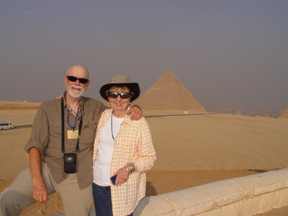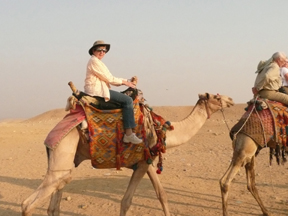
This is a page about our Nile River Cruise.
At some point it will contain Nile River Info and take you to the pictures -tbd.
When I think about Cairo I think of an overcrowded city with traffic jams, smog, and friendly people. We spent little time in central Cairo mostly because it is so hard to get around. One could spend an hour traveling a quarter mile.
I thought our highlights were our location. Describe the island, the ferry, the tower, the lovers bridge, the felucas, the flower place, the nubian village, the home hosted dinner. What else?
This following is just junk text to fill the space---------------
Our long awaited trip to Egypt and Jordan started with a two night stay in SF for Fleet Week and to see the Blue Angeles. We also wanted to be close to SFO for our 6:00 AM flight to JFK where we joined up with our Illinois traveling friends, Marilyn & Bob Wilson, before boarding an overnight flight to Cairo.
For someone who just loves to travel I really hate the very long flights. This on was no exception. We flew Egyptair. The flight was absolutely full and took 11 plus hours. To our surprise and dismay no alcoholic drinks were served. EgyptAir is really missing the boat.
Upon arrival in Cairo, we met our tour guide Hazem plus the other 40 or so members of our tour group, got our luggage, paid $15.00 for our Egypt visa, cleared immigration, boarded our bus and set off to our hotel.
After checking in we headed to the pool piano bar where I discovered Sakara Gold beer and immediately dubbed it my drink of choice for the next 20 days. Although Sakara is made by Heineken there is no skunkiness smell. Yes, their no alcohol culture doesn't apply everywhere. Booze can be found in the major tourist hotels and restaurants and even in the markets but not on the airline.
Our hotel, the Sofitel El Gezirah, was ideally located on Elephantine Island in the middle of the Nile River and walking distance to the city center across "Lovers Bridge" where the young met to chat, look into each others eyes & hold hands.
According to our guide, Egypt's population is unknown but is estimated at over 88 million people mostly located along the Nile River & Delta area. Cairo has in excess of 18 million people. More than 90% of Egypt is desert.
Modern Cairo as we know it today dates back to 1863 when Khedive Ismail Pasha (Ismail the Magnificent - R.1863-1879) came to power. His aim was to transform Cairo into a modern, fashionable city that would compare with Paris. He drained the marshy flood plain between the old city and the Nile which is still the heart of central Cairo. He also completed the Suez Canal. Ismail succeeded - his dream was realized in the creation of a quarter with wide, tree-lined boulevards, grand squares, and public gardens, capped by an Italianate opera house.

Cairo is the most densely populated city in the World. This is evidenced by the horrific traffic jams - not just at commute time but all the time. There are almost no traffic rules. The people think the white lane lines are there for decoration so everyone drives all over the place racing to get ahead of each other. All cars have multiple dents. It seems fender/bender is a way of life when driving. 'J-walkers' are amazing. They have no fear and cross anywhere with little regard for the traffic.
In all our travels I've never seen such traffic (well maybe Bangkok) which causes a horrendous air pollution problem. Added to that is that all their gas is leaded. You can actually taste it. That combined with blowing sand/dust covering the city gives it a ghostly appearance.
Looking out the airplane window as we were landing the first thing I noticed was the pollution and the color (or lack of it) of the city and the buildings. Everything was a hazy color of sand or dust. Later I found out that everything, I mean everything was covered with a layer of dust and dirt.
The other very noticeable thing was how heavily guarded everything was - Security was everywhere. All uniformed police are armed and the plain clothed tourist police all have Uzi weapons under their suit jackets.
We boarded our bus and before we left the airport grounds our personal plain clothed armed tourist guard joined us on the bus for the ride to the hotel. We never went anywhere without an armed guard. Upon arrival at the hotel we and our baggage went through metal detectors and a good once-over by several hotel security guards. We weren't sure whether we should feel safer or be concerned. Egypt hasn't had a terrorist problem since the Luxor Massacre back in 1997 where 59 tourists were killed.
We never felt we were in any danger. My only worry was the guards lack of concern with their weapons. I wondered whether one of the policemen would accidently shoot one of us. Did those guns have safeties?
Although the Nomadic population can be traced back as far as 10,000 BC, Egyptian history is generally given as 3,100 BC. The area was divided (polarized) into two opposing kingdoms of North (Lower Egypt) and South (Upper Egypt). Around 3,000 BC the two halves were unified by King Narmer (Menes).
It is believed the first capital of the United Egypt was Memphis with the earliest burial sites being near by in Saqqara, the site of Egypt's earliest pyramid (2650BC), the Step pyramid of Djoser. The Step pyramid built for King Djoser was constructed by his architect, the high priest Imhotep and was the prototype for all other pyramids that followed.
After finishing our Sakarra Gold beers we unpacked, freshened up and went down for our trip briefing and a great welcoming dinner.
It is believed that the first capital of ancient Egypt was Memphis, a city whose name can be roughly translated into English as "White Walls." Located in Lower Egypt, just below the Nile Delta, Memphis was founded by Menes, the first king of Egypt, around 3,000 B.C. following his unification of the country. During the First Dynasty, Egypt's center of government was located in Memphis because the city united Upper and Lower Egypt. Memphis is famous for the cemetery at Saqqara.
The Nile River is the longest river in the World with a length greater than 4,000 miles. One doesn't swim in the Nile river for two reasons - it's polluted and full of crocodiles that can grow in excess of four meters.
We've broken up the Egypt part of our trip into seven major parts. For more info and pictures on each just click below. They are arranged left to right as we traveled.